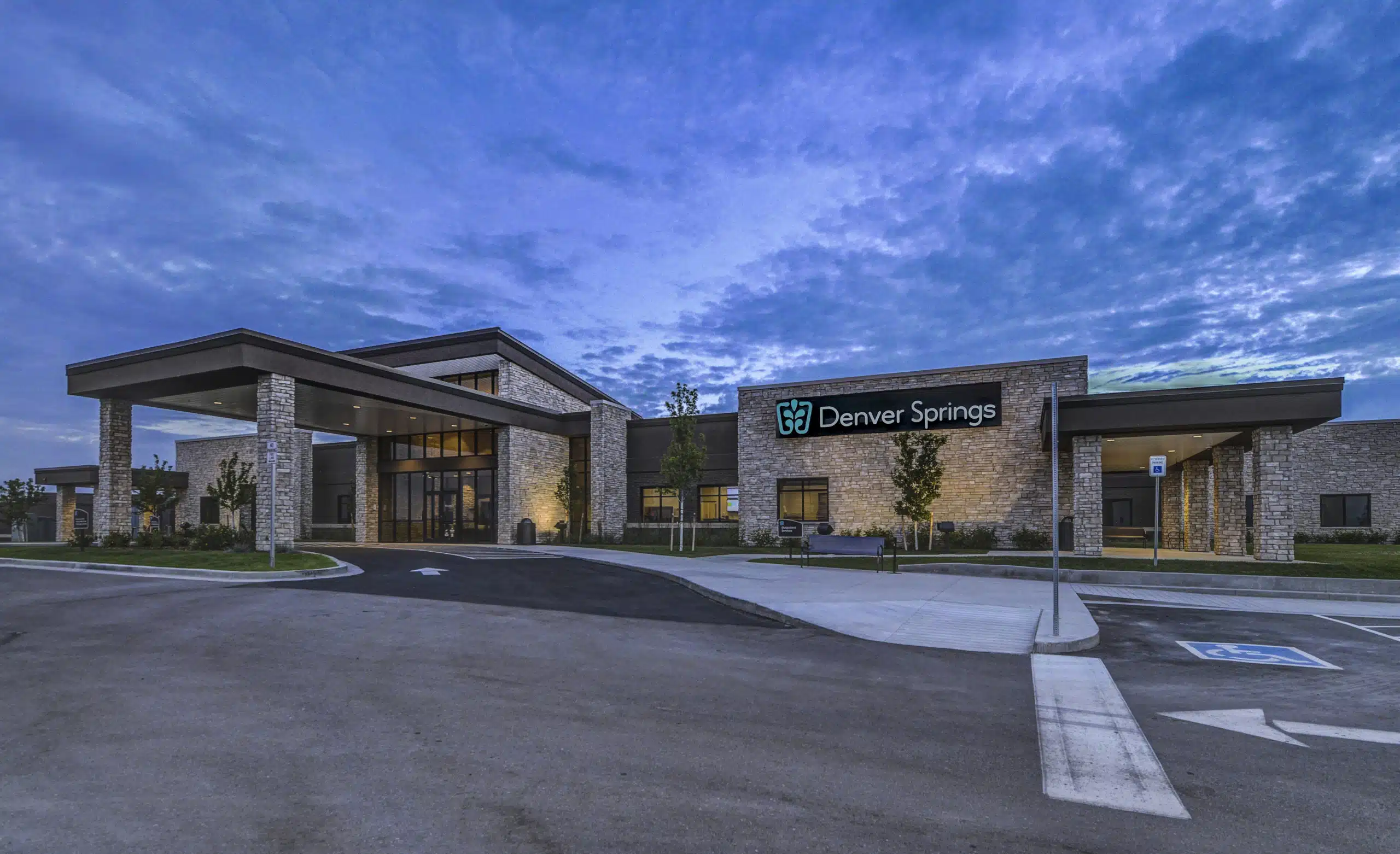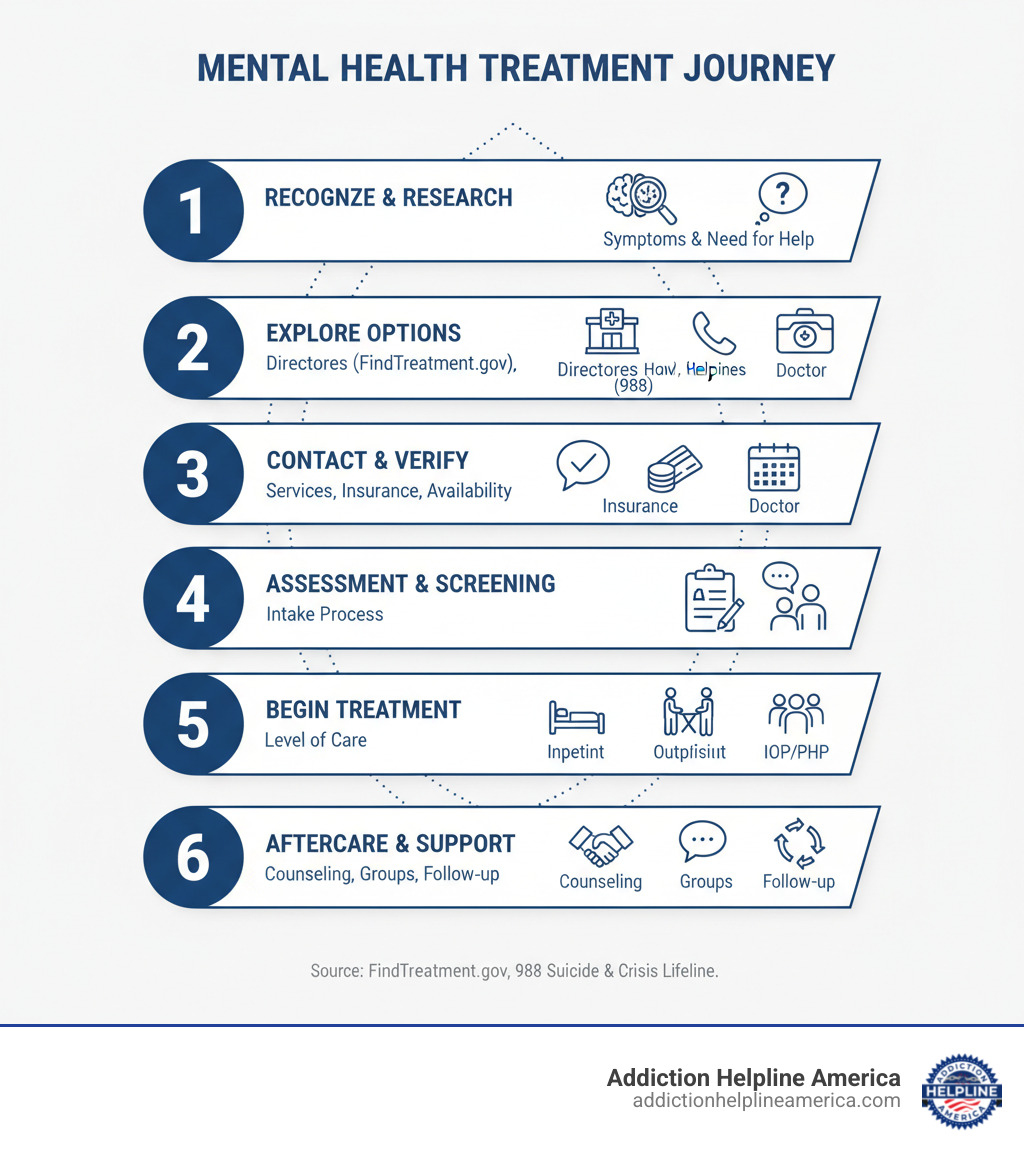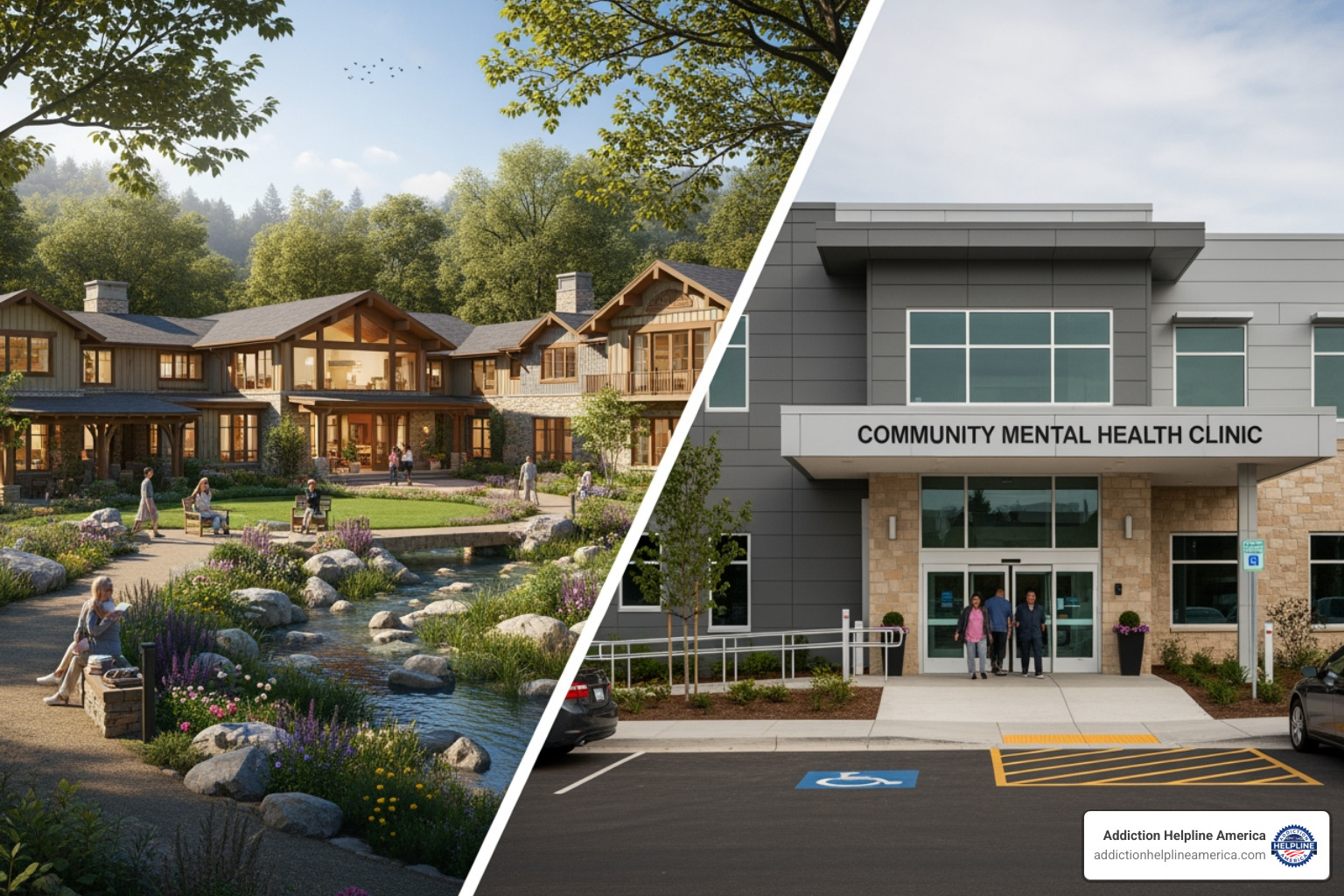
Why Finding the Right Mental Health Support Matters More Than Ever
Mental health facilities near me can be found through three main methods: official directories like SAMHSA’s FindTreatment.gov, your primary care physician and local healthcare system, or specialized 24/7 helplines and crisis resources. Each approach offers different advantages for finding treatment that matches your specific needs.
Quick Ways to Find Mental Health Facilities:
- National Directories – Use FindTreatment.gov for a confidential, searchable database of facilities.
- Your Doctor – Ask your primary care physician for referrals and insurance guidance.
- Crisis Helplines – Call 988 (Suicide & Crisis Lifeline) or 1-800-662-HELP for immediate support and local resources.
When you or a loved one is struggling, the search for help can feel overwhelming. According to the 2023 National Survey on Drug Use and Health, approximately 20.4 million American adults had a co-occurring mental health and substance use disorder in the past year. You’re not alone, and the right support is available.
The challenge isn’t just finding a facility—it’s about finding the right one, as treatment isn’t one-size-fits-all. This guide will walk you through three effective ways to locate mental health facilities near me that match your specific situation.
At Addiction Helpline America, we’ve helped thousands of individuals and families find appropriate mental health facilities near me through our 24/7 support network. Our team connects people with the right level of care, ensuring everyone gets personalized guidance on their path to recovery.
Understanding the Different Levels of Mental Health Care
When you start searching for mental health facilities near me, you’ll find many different types of programs. Understanding these levels of care helps you find what you need right now.
-
Inpatient programs provide the highest level of care. You live at the facility and receive 24/7 medical and psychiatric supervision, which is best for crisis situations or severe symptoms.
-
Residential treatment is a live-in arrangement with less medical intensity than inpatient care. You stay for weeks or months in a therapeutic community to heal without outside pressures.
-
Partial Hospitalization Programs (PHP) are day treatment programs where you attend the facility for several hours a day, five days a week, and return home at night.
-
Intensive Outpatient Programs (IOP) are a step down from PHP, with treatment a few hours a day, three to five days a week, allowing you to live at home.
-
Outpatient programs offer the most flexibility, with regular appointments with therapists or psychiatrists while you live at home.
-
Medical detox is for those with substance use disorders who are physically dependent on drugs or alcohol. It provides medical supervision for safe withdrawal before other treatment begins.
What are inpatient vs. outpatient services?
The biggest difference between inpatient and outpatient care is where you sleep at night and the intensity of support.
Inpatient services mean you live at the facility 24/7. This structured environment is ideal for crisis situations, severe symptoms, or when a home environment is not supportive. Psychiatric hospitals and residential treatment centers fall into this category.
Outpatient services allow you to live at home while attending scheduled treatment sessions. This flexibility helps you practice new skills in real-world situations. Outpatient care ranges from weekly therapy to more intensive programs like PHP and IOP. A clinical assessment helps determine which setting is best for you.
Specialized Programs for Specific Conditions
Many mental health facilities near me offer specialized programs for specific conditions or populations, which can improve treatment effectiveness.
-
Depression and Anxiety Programs: These combine psychotherapy (like Cognitive Behavioral Therapy), medication management, and supportive therapies to teach practical skills for managing symptoms.
-
Addiction and Co-occurring Disorder Programs: These programs treat mental health conditions and substance use disorders at the same time. An integrated approach is essential, as these conditions often influence each other. SAMHSA research shows this integrated approach works better than treating each condition separately.
-
Eating Disorder Programs: These address the psychological and physical aspects of anorexia, bulimia, and binge eating disorder through medical monitoring, nutritional counseling, and therapy.
-
Trauma-Informed Care: These programs recognize how trauma affects the brain and body, using therapies like EMDR to process traumatic memories.
-
Programs for Veterans and LGBTQ+ Individuals: These provide safe, affirming care that understands the unique challenges and experiences of these communities.
Way 1: Use Official and Trusted Directories
Some of the best tools for finding mental health facilities near me are official government directories. These free, confidential, and vetted databases connect people with legitimate, licensed facilities, saving you hours of guesswork.
Unlike random internet searches, these resources are regularly updated and backed by federal or state oversight, ensuring you get verified information about licensing, services, and payment options.
Leverage National and Local Directories
In the United States, a great starting point is FindTreatment.gov, the official treatment locator from the Substance Abuse and Mental Health Services Administration (SAMHSA). This confidential and anonymous search platform is a valuable resource authorized by the 21st Century Cures Act.
Its powerful filtering system allows you to narrow your search by:
- Facility Type: Mental health, substance use, or co-occurring disorder treatment.
- Service Setting: Outpatient, residential, or hospital inpatient services.
- Treatment Approaches: Specific therapies like CBT, DBT, or EMDR.
- Payment Options: Facilities that accept Medicare, Medicaid, private insurance, or offer payment assistance. The Affordable Care Act (ACA) makes mental health coverage an essential health benefit for most insurance plans.
- Specialized Programs: Services for veterans, LGBTQ+ individuals, or specific language needs.
While SAMHSA also publishes annual directories like the 2024 National Directory of Mental Health Treatment Facilities, the online platform is more current. Always call a facility directly to verify services and availability.
Explore State and Local Health Department Resources
Your state and local health departments offer region-specific information. These agencies license and regulate mental health services, making them reliable sources. Many states maintain their own searchable directories with details on state-operated facilities, community mental health centers, and local programs.
For example, states like New York, California, and Connecticut provide detailed lists. To find these resources, search online for “[Your State] Department of Mental Health.” Your county’s mental health office is another excellent source for community-based services.
Way 2: Steer Your Local Healthcare System to Find Mental Health Facilities Near Me
Your primary care physician (PCP) is a valuable resource when searching for mental health facilities near me. Your doctor can act as a guide, helping you steer your options based on your health history.
Your PCP is trained to recognize mental health concerns, conduct initial assessments, and connect you with specialists. They also understand the interplay between mental and physical health. Their office can help with insurance questions, identifying in-network facilities and managing referral requirements.
How to find mental health facilities near me for specific needs
Starting a conversation with your PCP taps into their local knowledge and medical expertise. An honest discussion about your symptoms allows your doctor to conduct an initial clinical assessment, rule out physical causes, and provide a preliminary diagnosis. This helps point you toward the right type of care, such as facilities specializing in co-occurring disorders.
Your doctor’s recommendations are based on experience, not just online reviews. They can provide coordinated care, communicating with your mental health providers (with your permission) to ensure treatments work together safely. Their office staff can also be your insurance navigator, helping you understand your benefits under the Affordable Care Act. Be open with your doctor; the more they know, the better they can guide you.
What to know about the admission process for mental health facilities near me
Understanding the admission process can ease anxiety. The process varies but generally follows a few key steps.
Voluntary admission is the most common path, where you choose to seek help. It typically starts with a phone call to the facility, followed by a screening or intake assessment. This evaluation helps the clinical team create the best treatment plan for you. You will also complete paperwork regarding your medical history and insurance.
Involuntary admission occurs in crisis situations when someone is an immediate danger to themselves or others. State laws define the specific criteria, but it generally involves emergency services and an evaluation by a mental health professional. Even in these cases, patients have rights, including legal representation.
If you are in a mental health emergency, go to any emergency room, call 911, or contact a crisis helpline like 988. Emergency rooms can stabilize crises and connect you with inpatient facilities.
Way 3: Tap Into Specialized Helplines and Crisis Resources
Specialized helplines offer immediate human connection and guidance, any time of day or night. You don’t have to be in an emergency to use them; they are designed to help anyone who needs support, whether you’re in crisis or just figuring out where to start looking for mental health facilities near me.
Trained specialists on these helplines can help assess your situation, provide emotional support, and connect you with local treatment options. For families, they can offer referrals and guidance on handling difficult conversations.
Helplines for Immediate Guidance
Three major helplines are essential resources for immediate support and information:
-
The 988 Suicide & Crisis Lifeline: Call or text 988 anytime for any mental health crisis, including substance use struggles. Trained counselors provide immediate emotional support and can connect you to local resources. Learn more at 988lifeline.org.
-
SAMHSA’s National Helpline at 1-800-662-HELP (4357): This 24/7 service provides referrals to local facilities, support groups, and community organizations for mental health and substance use issues. It’s a great resource if you feel overwhelmed by your options. More information is available at SAMHSA’s National Helpline page.
-
The Disaster Distress Helpline at 1-800-985-5990: This helpline provides crisis counseling for those struggling emotionally after a disaster or other traumatic event. Visit the Disaster Distress Helpline page for details.
These helplines actively work to connect you with the right resources based on your specific needs, including location, symptoms, and insurance.
Support Resources for Families and Caregivers
When a loved one is struggling, family members and caregivers need support too. There are resources designed to help you steer the system and manage your own stress.
-
Family support groups, like those offered by the National Alliance on Mental Illness (NAMI), provide a space to share experiences with others who understand.
-
Education about mental illness can help you communicate more effectively and respond with empathy. Many organizations offer free resources to explain conditions and treatments.
-
Learning to steer the system is crucial. Resources like SAMHSA’s “What is substance abuse treatment? A booklet for families” offer practical guidance on finding care and understanding treatment.
-
Caregiver resources focus on your own well-being, teaching you to set boundaries and recognize burnout. Taking care of yourself is necessary to support your loved one effectively.
How to Choose the Right Facility: Key Questions to Ask
Once you’ve identified potential mental health facilities near me, it’s time to ask the right questions to ensure a facility is a good fit. Don’t be afraid to ask tough questions; a reputable facility will provide clear, honest answers.
Credentials, Licensing, and Treatment Approach
When you contact facilities, be prepared with these questions:
-
Is the facility licensed and accredited? Licensing ensures basic safety standards, while accreditation from organizations like The Joint Commission or CARF indicates higher quality.
-
What are the staff’s qualifications? Look for licensed psychiatrists, psychologists, social workers, and certified counselors with experience in your specific condition.
-
What is the primary treatment approach? Ask about their philosophy, such as a recovery model of care, and what evidence-based therapies they use. Look for therapies like Cognitive Behavioral Therapy (CBT) and Dialectical Behavior Therapy (DBT), which has shown positive outcomes for dual diagnoses.
-
How are treatment plans individualized? A quality facility will tailor your treatment to your specific goals and history.
-
What is the staff-to-patient ratio? A lower ratio often means more personalized attention.
-
What does a typical day look like? A schedule should show a balance of therapy, skill-building, and appropriate free time.
-
Do you offer specialized programs? Ask about programs for co-occurring disorders, trauma, veterans, or LGBTQ+ individuals.
-
What kind of aftercare planning do you provide? Effective programs help you build a plan for life after discharge to support long-term recovery.
-
What is your policy on family participation? If family involvement is important, ask about family therapy or educational workshops.
Understanding Costs, Insurance, and Payment Options
The cost of treatment can be a major concern, but understanding your options can reduce stress.
-
Does the facility accept my insurance? Verify if the facility is in-network with your specific plan to minimize out-of-pocket costs. Thanks to the ACA, most plans must cover mental health services. Learn more at Mental Health & Substance Abuse Coverage.
-
What will my out-of-pocket costs be? Ask about co-pays, deductibles, and co-insurance. Request a cost estimate if possible.
-
Do you offer payment plans or financial assistance? Many facilities offer monthly payment plans. Non-profit or community-based programs may offer sliding-scale fees based on income.
Common payment options include:
- Private Insurance: Covers treatment at in-network facilities, though you’ll have out-of-pocket costs.
- Medicaid and Medicare: Provide coverage, but verify that the specific facility accepts your plan.
- Sliding Scale: Fees are adjusted based on your income.
- Private Pay: You pay the full cost out-of-pocket.
Don’t let cost stop you from seeking help. At Addiction Helpline America, our 24/7 helpline can assist you in understanding your benefits and finding affordable treatment options.
Way 1: Use Official and Trusted Directories
Instead of a simple web search for mental health facilities near me, turn to official government directories. These vetted, reliable databases are maintained by regulatory agencies and provide verified information on licensed facilities.
Leverage National and Local Directories
Your first stop in the U.S. should be FindTreatment.gov, a confidential and anonymous platform from the Substance Abuse and Mental Health Services Administration (SAMHSA). It allows you to filter searches by facility type, level of care, treatment approach, payment options (including Medicare, Medicaid, and private insurance), and specialized programs for populations like veterans. The Affordable Care Act ensures most insurance plans cover these essential health benefits.
Explore State and Local Health Department Resources
For more localized information, check your state and local health department websites. These agencies license facilities and often maintain their own detailed directories of state-run programs, community mental health centers, and other local resources. Search for “[Your State] Department of Mental Health” to find services in your area. Always call a facility to confirm details before visiting.
Way 2: Steer Your Local Healthcare System to Find Mental Health Facilities Near Me
Your primary care physician (PCP) is a powerful ally in your search for mental health facilities near me. They can provide clinical assessments, offer referrals to trusted specialists, and help you steer insurance complexities.
How to find mental health facilities near me for specific needs
Starting with your PCP is a smart move for several reasons:
- Clinical Assessment: Your doctor can perform an initial evaluation to identify your needs and rule out underlying physical causes.
- Professional Recommendations: PCPs have local healthcare knowledge and can refer you to specialists or facilities with strong reputations.
- Coordinated Care: They can ensure your mental and physical health treatments are integrated, which is vital for overall well-being.
- Insurance Navigation: Their office can help you understand your insurance coverage and handle referral paperwork.
What to know about the admission process for mental health facilities near me
Understanding the admission process can help you feel prepared.
- Voluntary Admission: Most people choose to enter treatment. The process usually involves an initial call, a clinical assessment to determine the right level of care, and intake paperwork.
- Involuntary Admission: This occurs in a crisis when a person is a danger to themselves or others. Criteria are set by state law and the process typically involves emergency services and a professional evaluation. Patients retain legal rights throughout this process.
- Emergency Services: In a crisis, go to an ER, call 911, or contact a crisis hotline. They can provide immediate stabilization and connect you to further care.
Way 3: Tap Into Specialized Helplines and Crisis Resources
When you need immediate support or don’t know where to start, specialized helplines offer guidance from trained professionals 24/7. These resources are not just for emergencies; they can help anyone looking for information on mental health facilities near me.
Helplines for Immediate Guidance
These national helplines offer free, confidential support:
-
988 Suicide & Crisis Lifeline: Call or text 988 for any mental health or substance use crisis. Counselors provide support and connect you to local resources. Visit 988 Suicide & Crisis Lifeline.
-
SAMHSA National Helpline (1-800-662-HELP): A 24/7 treatment referral service that can connect you with local facilities, support groups, and community organizations. Learn more at the National Helpline page.
-
Disaster Distress Helpline (1-800-985-5990): Provides crisis counseling for those affected by natural or human-caused disasters. More info at the Disaster Distress Helpline page.
Support Resources for Families and Caregivers
Families and caregivers also need support. Resources are available to help you steer the system and care for your own well-being.
- Family support groups, like those from NAMI, connect you with others who share similar experiences.
- Educational resources help you understand mental illness and provide more effective support.
- Caregiver resources teach self-care strategies to prevent burnout.
Navigating the system for a loved one is challenging. The SAMHSA publication What is substance abuse treatment? A booklet for families offers practical advice.
How to Choose the Right Facility: Key Questions to Ask
You’ve found potential mental health facilities near me, but now you must determine which one is the right fit. This is a conversation to find a partner in your recovery.
Credentials, Licensing, and Treatment Approach
When interviewing a facility, ask about these key areas to ensure quality and safety:
- Licensing and Accreditation: Is the facility licensed by the state and accredited by an organization like The Joint Commission or CARF?
- Staff Qualifications: What are the credentials of the clinical staff (e.g., psychiatrists, licensed therapists)?
- Treatment Philosophy: What is their approach to care? Do they use evidence-based therapies like Cognitive Behavioral Therapy (CBT) or Dialectical Behavior Therapy (DBT)? Research shows DBT can have positive outcomes for people with co-occurring disorders.
- Individualized Plans: How do they tailor treatment to each person’s unique needs and goals?
- Staff-to-Patient Ratio: A lower ratio can mean more personalized care.
- Specialized Programs: Do they offer integrated treatment for co-occurring disorders, trauma-informed care, or programs for specific communities like veterans or LGBTQ+ individuals?
- Aftercare Planning: What support is provided after you leave to prevent relapse and sustain recovery?
- Family Involvement: What is their policy on including family in the treatment process?
Understanding Costs, Insurance, and Payment Options
Navigating the cost of treatment is crucial. Here’s what to consider:
- Insurance Coverage: The Affordable Care Act (ACA) made mental health care an essential health benefit. Verify if a facility accepts your specific insurance plan and whether it’s in-network to minimize costs. Ask about your deductible, co-pay, and any pre-authorization requirements.
- Government Programs: If you have Medicaid or Medicare, confirm that the facility accepts it.
- Other Options: If you lack sufficient insurance, ask about sliding scale fees based on income, payment plans, or other financial assistance programs.
- Leave from Work: The Family and Medical Leave Act (FMLA) may allow you to take up to 12 weeks of unpaid, job-protected leave for mental health treatment. You can look online for more information on FMLA to see if you qualify.
Always verify costs and coverage with both the facility and your insurance provider before beginning treatment.
Frequently Asked Questions about Finding Mental Health Treatment
What is the difference between a psychiatric hospital and a residential treatment center?
A psychiatric hospital is for short-term crisis stabilization. It provides intensive medical monitoring and 24/7 supervision for acute symptoms, such as a risk of suicide or severe psychosis. Stays are typically a few days to a few weeks.
A residential treatment center offers longer-term, comprehensive care in a structured therapeutic environment. The focus is on healing underlying issues and building coping skills over weeks or months, with less medical intensity than a hospital.
Can I take time off work for mental health treatment?
Yes. The Family and Medical Leave Act (FMLA) may allow eligible employees to take up to 12 weeks of unpaid, job-protected leave for a serious health condition, which includes clinically diagnosed mental health conditions. To qualify, you generally must have worked for a covered employer for at least 12 months and 1,250 hours. You can look online for more information on FMLA on the Department of Labor’s website. This allows you to focus on treatment without fear of losing your job.
How do I know which level of care is right for me?
A clinical assessment by a mental health professional is the best way to determine the right level of care. They will evaluate your symptoms, daily functioning, and support system to recommend the most effective and least restrictive setting for your needs.
Based on this evaluation, they may recommend:
- Outpatient therapy for manageable symptoms.
- Intensive Outpatient (IOP) or Partial Hospitalization (PHP) for more structured care while living at home.
- Residential treatment or inpatient hospitalization for severe symptoms requiring 24/7 support.
You don’t have to be an expert. The first step is to reach out for an assessment. At Addiction Helpline America, we can help connect you with professionals who can guide you to the right level of care.
Conclusion
Searching for mental health facilities near me can feel daunting, but you have powerful resources available. From official directories like SAMHSA’s FindTreatment.gov to the trusted guidance of your primary care physician and the immediate support of 24/7 helplines, help is within reach.
What matters most is taking that first step. You are not alone. With millions of Americans facing similar challenges, effective and compassionate care exists, and recovery happens every day.
By understanding the different levels of care and knowing what questions to ask, you can make confident choices for your health. This journey is one you don’t have to steer by yourself.
At Addiction Helpline America, we provide free, confidential guidance to help you find the right mental health facilities near me from our nationwide network. Our team is ready to help you find a program that matches your unique needs and goals.
Recovery is possible. Healing is real. The right help is available now.
Our helpline is 100%
free & confidential
If you or someone you care about is struggling with drug or alcohol addiction, we can help you explore your recovery options. Don’t face this challenge alone—seek support from us.
Programs
Resources
Will my insurance
cover addiction
treatment?
We're ready to help
Find the best
drug or alcohol treatment
center
Are you or a loved one struggling with addiction? Call today to speak to a treatment expert.

















